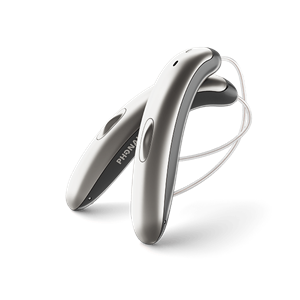Ear pressure: 6 causes and how to get relief

Ear pressure: 6 causes and how to get relief
5 min.
Publication Date: July 18, 2019
Article Updated: December 3, 2025
Ear pressure is one of those symptoms that can appear suddenly and make everything feel off. Maybe your ear feels plugged after a cold, or sounds seem muted after a flight. Because your ears, nose, and throat are closely connected, congestion or irritation in one area often affects another. When the system that equalizes ear pressure becomes disrupted, you may feel fullness, popping, or discomfort that’s hard to ignore.
Fortunately, most causes of ear pressure are temporary and highly treatable. The important thing is to understand what’s causing that clogged or pressurized feeling so you can choose the right approach and know when it’s time to speak with a healthcare provider.
So, let’s take a look at six of the most common causes, what’s happening inside your ears, and which remedies may help ease the pressure.
- What is ear pressure?
- Common causes of ear pressure
- How to relieve ear pressure
- When to see a doctor
- Understanding and supporting your ear health
Note: Our Hearing Care Providers (HCPs) are here to support your ear health and provide personalized guidance. However, if you’re concerned about ear pressure or other medical issues affecting your hearing, always consult a healthcare provider first.
What is ear pressure?
Ear pressure usually relates to the Eustachian tube, a small channel connecting your middle ear to the back of your throat. Its job is to keep air pressure balanced and allow fluid to drain. When the tube becomes blocked or inflamed—most often as the result of sinus congestion and infections—pressure can build up behind the eardrum.
Common causes of ear pressure
Here are six of the most frequent reasons people feel pressure, fullness, or popping in their ears.
1. Sinus congestion
When your sinuses become inflamed from a cold, allergies, or sinusitis, the swelling can affect the Eustachian tubes as well. With reduced airflow and increased mucus, pressure begins to build. This often creates the familiar “plugged ear” sensation.
2. Fluid buildup in the middle ear
If the Eustachian tubes aren’t draining well, fluid can accumulate behind the eardrum. This often leads to a sense of heaviness or fullness and may temporarily affect hearing. Prolonged fluid buildup increases the risk of infection and should be monitored if symptoms persist.
3. Earwax blockage
While earwax is protective, excessive buildup can block the ear canal and cause pressure or discomfort. Symptoms can include fullness, hearing loss, or occasional dizziness. Using cotton swabs can push wax deeper, so professional removal is usually the safest method.
4. Allergies
Allergic reactions cause inflammation in the nose and throat, which can narrow the Eustachian tube openings. This makes it harder for pressure to equalize and may lead to popping, fullness, or mild ear pain. Antihistamines or decongestants may help when allergies are the root cause.
5. Air travel and altitude changes
Rapid altitude changes, especially during takeoff and landing, can create a temporary imbalance between the middle ear and the outside environment. This “airplane ear” effect is more common when flying with a cold, allergies, or sinus congestion.
6. Ear infections
Middle ear infections (otitis media) and outer ear infections (otitis externa) can cause pressure and discomfort. Swelling, fluid buildup, and inflammation make it harder for the ear to function normally. Symptoms may include fever, sharp pain, ear drainage, or noticeable hearing changes.
How to relieve ear pressure
The best remedy depends on the cause, but many people find relief with simple home care:
- Swallowing, yawning, or chewing gum to help open the Eustachian tubes
- Warm compresses to relax surrounding muscles
- Nasal saline rinses or sprays to reduce congestion
- Hydration to thin mucus
- Steam inhalation to ease sinus pressure
- Over-the-counter antihistamines or decongestants, when appropriate
- The Valsalva manoeuvre (gently blowing with nostrils pinched) to help equalize pressure
- Avoiding Q-tips or inserting objects into the ear canal
When to see a doctor
If ear pressure continues for more than two weeks, becomes more painful over time, or starts to interfere with your hearing, it’s worth checking in with a healthcare provider. Persistent pressure can sometimes indicate a sinus infection, middle ear infection, or Eustachian tube dysfunction that requires medical treatment.
You should also seek care if you notice concerning symptoms such as ear drainage, fever, dizziness, balance issues, and sudden hearing loss or changes. These signs suggest that inflammation or infection has progressed beyond what home care can manage, and a clinician can assess your ears and recommend the right next steps.
Understanding and supporting your ear health
Ear pressure can be uncomfortable, but in many cases it improves once the underlying cause is treated. Paying attention to your symptoms and taking steps to reduce inflammation or congestion can help restore normal pressure balance.
Key takeaways
- Most ear pressure comes from blocked or inflamed Eustachian tubes.
- Sinus congestion, allergies, infections, wax buildup, fluid, and air travel are common triggers.
- Many cases respond well to home remedies and time.
- Persistent or severe symptoms should be checked by a healthcare provider.
If ear pressure is affecting your comfort or clarity of hearing, we’re here to help. You can book a free hearing test or find a Connect Hearing clinic near you to get personalized support.



